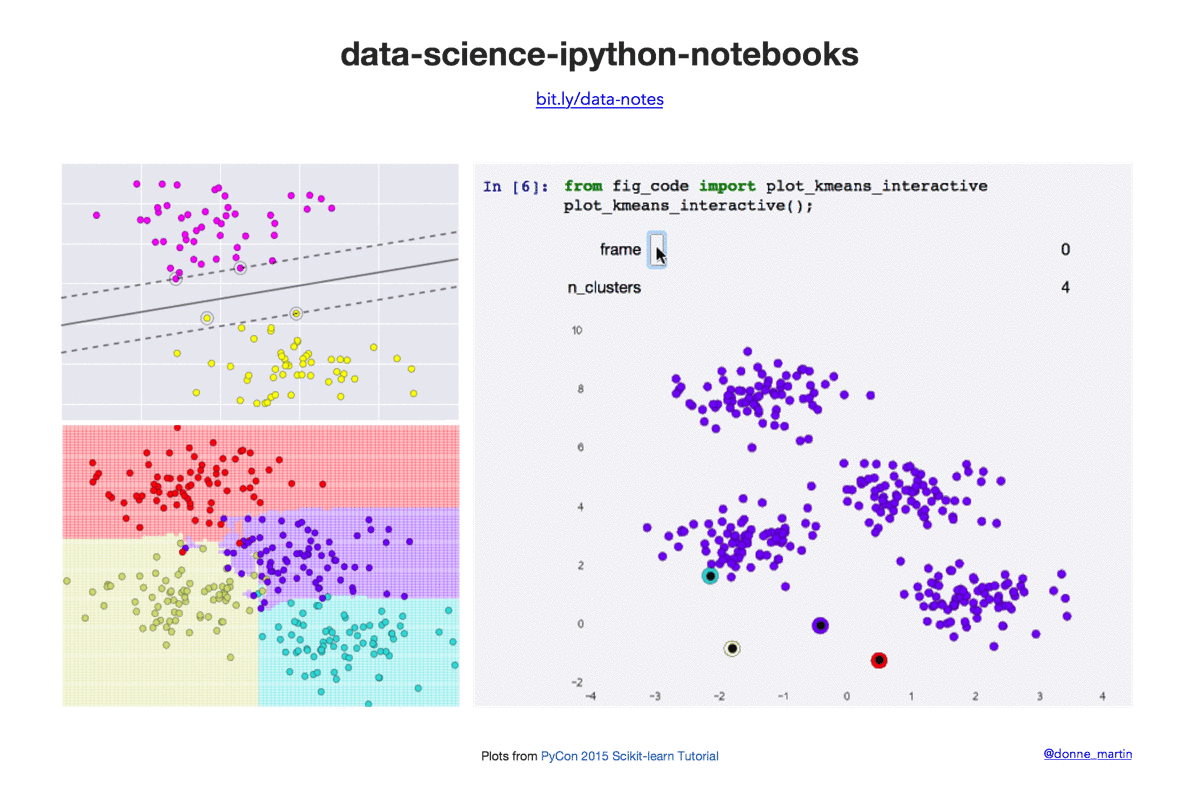Continually updated Data Science IPython Notebooks.
Notebooks include: Spark, Hadoop MapReduce, HDFS, AWS, Kaggle, scikit-learn, matplotlib, pandas, NumPy, SciPy, Python, and various command lines.
This repo is a collection of IPython Notebooks I reference while working with data.
- spark
- mapreduce-python
- amazon web services
- kaggle
- scikit-learn
- pandas
- matplotlib
- numpy
- scipy
- python-data
- command lines
- notebook-installation
- credits
- license
IPython Notebook(s) demonstrating spark and HDFS functionality.
| Notebook | Description |
|---|---|
| spark | In-memory cluster computing framework, up to 100 times faster for certain applications and is well suited for machine learning algorithms. |
| hdfs | Reliably stores very large files across machines in a large cluster. |
IPython Notebook(s) demonstrating Hadoop MapReduce with mrjob functionality.
| Notebook | Description |
|---|---|
| mapreduce-python | Supports MapReduce jobs in Python with mrjob, running them locally or on Hadoop clusters. Demonstrates mrjob code, unit test, and config file to analyze Amazon S3 bucket logs on Elastic MapReduce. |
IPython Notebook(s) demonstrating Amazon Web Services (AWS) and AWS tools functionality.
| Notebook | Description |
|---|---|
| s3cmd | Interacts with S3 through the command line. |
| s3distcp | Combines smaller files and aggregates them together by taking in a pattern and target file. S3DistCp can also be used to transfer large volumes of data from S3 to your Hadoop cluster. |
| s3-parallel-put | Uploads multiple files to S3 in parallel. |
| redshift | Acts as a fast data warehouse built on top of technology from massive parallel processing (MPP). |
| kinesis | Streams data in real time with the ability to process thousands of data streams per second. |
| lambda | Runs code in response to events, automatically managing compute resources. |
IPython Notebook(s) used in kaggle competitions.
| Notebook | Description |
|---|---|
| titanic | Predicts survival on the Titanic. Demonstrates data cleaning, exploratory data analysis, and machine learning. |
IPython Notebook(s) demonstrating scikit-learn functionality.
Credits: Forked from PyCon 2015 Scikit-learn Tutorial by Jake VanderPlas
| Notebook | Description |
|---|---|
| intro | Intro notebook to scikit-learn. Scikit-learn adds Python support for large, multi-dimensional arrays and matrices, along with a large library of high-level mathematical functions to operate on these arrays. |
| knn | K-nearest neighbors. |
| linear-reg | Linear regression. |
| svm | Support vector machine classifier, with and without kernels. |
| random-forest | Random forest classifier and regressor. |
| k-means | K-means clustering. |
| pca | Principal component analysis. |
| validation | Validation and model selection. |
IPython Notebook(s) demonstrating pandas functionality.
| Notebook | Description |
|---|---|
| pandas | Software library written for data manipulation and analysis in Python. Offers data structures and operations for manipulating numerical tables and time series. |
| pandas io | Input and output operations. |
| pandas cleaning | Data wrangling operations. |
IPython Notebook(s) demonstrating matplotlib functionality.
Credits: Some content forked from Parallel Machine Learning with scikit-learn and IPython by Olivier Grisel
| Notebook | Description |
|---|---|
| matplotlib | Python 2D plotting library which produces publication quality figures in a variety of hardcopy formats and interactive environments across platforms. |
IPython Notebook(s) demonstrating NumPy functionality.
Credits: Forked from Parallel Machine Learning with scikit-learn and IPython by Olivier Grisel
| Notebook | Description |
|---|---|
| numpy | Adds Python support for large, multi-dimensional arrays and matrices, along with a large library of high-level mathematical functions to operate on these arrays. |
[Coming Soon] IPython Notebook(s) demonstrating SciPy functionality.
IPython Notebook(s) demonstrating Python functionality geared towards data analysis.
| Notebook | Description |
|---|---|
| data structures | Tuples, lists, dicts, sets. |
| data structure utilities | Slice, range, xrange, bisect, sort, sorted, reversed, enumerate, zip, list comprehensions. |
| functions | Functions as objects, lambda functions, closures, *args, **kwargs currying, generators, generator expressions, itertools. |
| datetime | Datetime, strftime, strptime, timedelta. |
| logging | Logging with RotatingFileHandler and TimedRotatingFileHandler. |
| pdb | Interactive source code debugger. |
| unit tests | Nose unit tests. |
IPython Notebook(s) demonstrating various command lines for Linux, Git, etc.
| Notebook | Description |
|---|---|
| linux | Unix-like and mostly POSIX-compliant computer operating system. Disk usage, splitting files, grep, sed, curl, viewing running processes, terminal syntax highlighting, and Vim. |
| anaconda | Distribution of the Python programming language for large-scale data processing, predictive analytics, and scientific computing, that aims to simplify package management and deployment. |
| ipython notebook | Web-based interactive computational environment where you can combine code execution, text, mathematics, plots and rich media into a single document. |
| git | Distributed revision control system with an emphasis on speed, data integrity, and support for distributed, non-linear workflows. |
| ruby | Used to interact with the AWS command line and for Jekyll, a blog framework that can be hosted on GitHub Pages. |
| jekyll | Simple, blog-aware, static site generator for personal, project, or organization sites. Renders Markdown or Textile and Liquid templates, and produces a complete, static website ready to be served by Apache HTTP Server, Nginx or another web server. |
Anaconda is a free distribution of the Python programming language for large-scale data processing, predictive analytics, and scientific computing that aims to simplify package management and deployment.
Follow instructions to install Anaconda or the more lightweight miniconda.
To view interactive content or to modify elements within the IPython notebooks, you must first clone or download the repository then run the ipython notebook. More information on IPython Notebooks can be found here
$ git clone https://github.com/donnemartin/data-science-ipython-notebooks.git
$ cd [downloaded repo directory name]
$ ipython notebook
- Python for Data Analysis: Data Wrangling with Pandas, NumPy, and IPython by Wes McKinney
- PyCon 2015 Scikit-learn Tutorial by Jake VanderPlas
- Parallel Machine Learning with scikit-learn and IPython by Olivier Grisel
- Yhat blog by Yhat
- Kaggle by Kaggle
- Spark Docs by Apache Spark
- AWS Docs by Amazon Web Services
Copyright 2015 Donne Martin
Licensed under the Apache License, Version 2.0 (the "License");
you may not use this file except in compliance with the License.
You may obtain a copy of the License at
http://www.apache.org/licenses/LICENSE-2.0
Unless required by applicable law or agreed to in writing, software
distributed under the License is distributed on an "AS IS" BASIS,
WITHOUT WARRANTIES OR CONDITIONS OF ANY KIND, either express or implied.
See the License for the specific language governing permissions and
limitations under the License.












